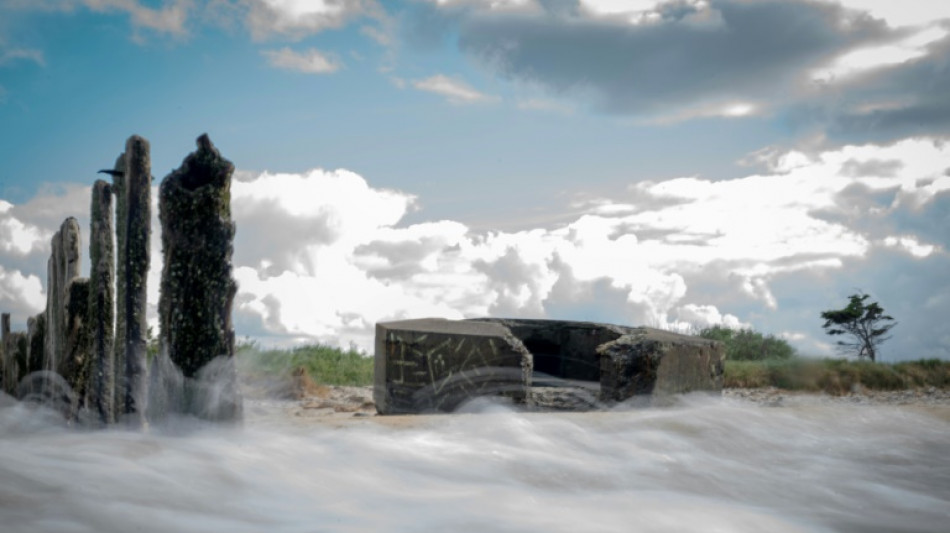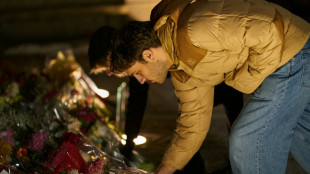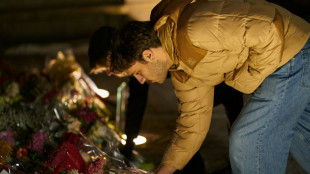
-
 Rome to charge visitors for access to Trevi Fountain
Rome to charge visitors for access to Trevi Fountain
-
Spurs 'not a quick fix' for under-fire Frank

-
 Poland president accuses Ukraine of not appreciating war support
Poland president accuses Ukraine of not appreciating war support
-
Stocks advance with focus on central banks, tech

-
 Amorim unfazed by 'Free Mainoo' T-shirt ahead of Villa clash
Amorim unfazed by 'Free Mainoo' T-shirt ahead of Villa clash
-
PSG penalty hero Safonov ended Intercontinental win with broken hand

-
 French court rejects Shein suspension
French court rejects Shein suspension
-
'It's so much fun,' says Vonn as she milks her comeback

-
 Moscow intent on pressing on in Ukraine: Putin
Moscow intent on pressing on in Ukraine: Putin
-
UN declares famine over in Gaza, says 'situation remains critical'

-
 Guardiola 'excited' by Man City future, not pondering exit
Guardiola 'excited' by Man City future, not pondering exit
-
Czechs name veteran coach Koubek for World Cup play-offs

-
 PSG penalty hero Safonov out until next year with broken hand
PSG penalty hero Safonov out until next year with broken hand
-
Putin says ball in court of Russia's opponents in Ukraine talks

-
 Czech Zabystran upsets Odermatt to claim Val Gardena super-G
Czech Zabystran upsets Odermatt to claim Val Gardena super-G
-
NGOs fear 'catastrophic impact' of new Israel registration rules

-
 US suspends green card lottery after MIT professor, Brown University killings
US suspends green card lottery after MIT professor, Brown University killings
-
Arsenal in the 'right place' as Arteta marks six years at club

-
 Sudan's El-Fasher under the RSF, destroyed and 'full of bodies'
Sudan's El-Fasher under the RSF, destroyed and 'full of bodies'
-
From farms to court, climate-hit communities take on big polluters

-
 Liverpool have 'moved on' from Salah furore, says upbeat Slot
Liverpool have 'moved on' from Salah furore, says upbeat Slot
-
Norway crown princess likely to undergo lung transplant

-
 Iraq negotiates new coalition under US pressure
Iraq negotiates new coalition under US pressure
-
France's budget hits snag in setback for embattled PM

-
 Putin hails Ukraine gains, threatens more, in annual press conference
Putin hails Ukraine gains, threatens more, in annual press conference
-
US suspends green card lottery after Brown, MIT professor shootings

-
 Chelsea's Maresca says Man City link '100 percent' speculation
Chelsea's Maresca says Man City link '100 percent' speculation
-
Dominant Head moves into Bradman territory with fourth Adelaide ton

-
 Arsenal battle to stay top of Christmas charts
Arsenal battle to stay top of Christmas charts
-
Mexican low-cost airlines Volaris and Viva agree to merger

-
 Border casinos caught in Thailand-Cambodia crossfire
Border casinos caught in Thailand-Cambodia crossfire
-
Australia's Head slams unbeaten 142 to crush England's Ashes hopes

-
 Epstein files due as US confronts long-delayed reckoning
Epstein files due as US confronts long-delayed reckoning
-
'Not our enemy': Rush to rearm sparks backlash in east Germany

-
 West Indies 110-0, trail by 465, after Conway's epic 227 for New Zealand
West Indies 110-0, trail by 465, after Conway's epic 227 for New Zealand
-
Arsonists target Bangladesh newspapers after student leader's death

-
 Volatile Oracle shares a proxy for Wall Street's AI jitters
Volatile Oracle shares a proxy for Wall Street's AI jitters
-
Tears at tribute to firefighter killed in Hong Kong blaze

-
 Seahawks edge Rams in overtime thriller to seize NFC lead
Seahawks edge Rams in overtime thriller to seize NFC lead
-
Teenager Flagg leads Mavericks to upset of Pistons

-
 Australia's Head fires quickfire 68 as England's Ashes hopes fade
Australia's Head fires quickfire 68 as England's Ashes hopes fade
-
Japan hikes interest rates to 30-year-high

-
 Brazil's top court strikes down law blocking Indigenous land claims
Brazil's top court strikes down law blocking Indigenous land claims
-
Conway falls for 227 as New Zealand pass 500 in West Indies Test

-
 'We are ghosts': Britain's migrant night workers
'We are ghosts': Britain's migrant night workers
-
Asian markets rise as US inflation eases, Micron soothes tech fears

-
 Giant lanterns light up Christmas in Catholic Philippines
Giant lanterns light up Christmas in Catholic Philippines
-
TikTok: key things to know

-
 Putin, emboldened by Ukraine gains, to hold annual presser
Putin, emboldened by Ukraine gains, to hold annual presser
-
Deportation fears spur US migrants to entrust guardianship of their children

| RBGPF | 0% | 80.22 | $ | |
| GSK | 0.55% | 48.556 | $ | |
| RIO | 0.58% | 78.08 | $ | |
| RYCEF | -0.98% | 15.25 | $ | |
| SCS | 0.12% | 16.14 | $ | |
| CMSC | 0.02% | 23.294 | $ | |
| BCC | -2.57% | 75.755 | $ | |
| NGG | -0.09% | 76.32 | $ | |
| CMSD | -0.06% | 23.265 | $ | |
| RELX | 0.12% | 40.7 | $ | |
| AZN | 0.91% | 91.44 | $ | |
| VOD | 0.86% | 12.911 | $ | |
| BTI | -0.39% | 56.82 | $ | |
| BCE | 0.47% | 22.958 | $ | |
| JRI | 0.01% | 13.431 | $ | |
| BP | 1.62% | 33.86 | $ |

France's historic D-Day beaches threatened by rising sea levels
As France prepares to mark 80 years since Allied forces landed on the beaches of Normandy, the historic coastline faces a new threat -- rising sea levels linked to climate change.
More than 100 kilometres (62 miles) of Normandy's coastline bear traces of June 6, 1944, including bunkers, shipwrecked vessels, and other vestiges from the Allied troops' first step to freeing western Europe from Nazi German occupation.
But now, the sea from which 150,000 Allied troops conducted the largest seaborne invasion in history threatens those same heritage sites.
Rising sea levels are eroding dunes and cliffs, while marshes and reclaimed land risk submersion at sites visited by millions each year.
The famed beaches –- code-named Utah, Omaha, Juno, Sword and Gold –- that were stormed by US, British Commonwealth and other allied troops have all drastically changed in 80 years.
The D-Day sites "already bear no resemblance to what Allied soldiers experienced on June 6, 1944", said Regis Leymarie, a geographer with the Coastal Conservatory in Normandy.
"We're in the process of moving from historic sites to places for interpreting history," he added.
And changes are coming fast.
Rising global sea temperatures are accelerating the melting of polar ice caps and increasing sea levels, posing a threat to Normandy's coastal communities.
"The environment will be transformed in 10 years or so," said Leymarie.
– 'We don't have any help'-
For some communities, these changes are already here.
In Graye-sur-Mer, a village along Juno Beach, the sea has toppled entire bunkers, leaving local residents worried that history is being swept out with the tide.
And yet, few town councils are prepared to take action.
Of the 15 or so contacted by AFP in recent months, fewer than half have replied.
Three others said they would not be "affected" or even "threatened" in the near future.
Charles de Vallavieille, the mayor of Sainte-Marie-du-Mont and director of the Utah Beach Museum, disagreed.
"(There are) difficulties. We must not deny them," he said.
Standing in front of the museum founded by his father in 1962, de Vallavieille recalled watching former soldiers return to Normandy.
"I've seen veterans waving to the sea, crying... It’s the emotion of the beach," de Vallavieille said.
He said these sites should be protected but that there are limitations to actions local leaders can take, adding: "We don’t have the right to do anything".
"We don't have any help even though it's a problem that affects the whole coast –- protect one place and the water will go elsewhere."
–'Coming to the end'-
Located between the American and British landing sites, the Bessin cliffs, which were the site of a daring vertical assault by US Army Rangers, have not been spared.
Several German artillery batteries stood on these hard-to-reach outcrops, including the famed Pointe du Hoc, which attracts some 500,000 visitors a year.
Ascending the 25-metre (82-foot) cliff face in foul weather and under German fire, only 90 of the 225 attackers escaped unharmed.
Managed by the American Battle Monuments Commission (ABMC), the site is very fragile and partially collapsed in 2022.
ABMC said it had taken several steps to "secure the area", including installing reinforced concrete walls and sensors to detect significant movement.
The agency also moved paths back 20 metres to ensure public safety.
For Normandy conservation official Leymarie, the only thing left to do is adapt to the coming changes.
Sea levels are currently rising by a few millimetres a year.
"It's only over two or three generations that we become aware of it," he said.
"We're coming to the end of the D-Day landing sites as we knew them," Leymarie said.
"And nature will reclaim its right."
Y.Nakamura--AMWN


